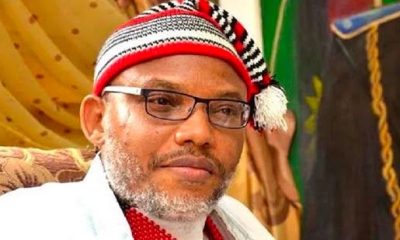Agriculture
Why CBN is Funding Large Scale Cassava Production – Emefiele

By Tony Obiechina, Abuja
The Governor of the Central Bank of Nigeria(CBN), Mr Godwin Emefiele said on Thursday, that the Bank decided to fund large scale production of cassava because it has the potential for employing over two million Nigerians.
Emefiele spoke at a meeting with State Governors of Cassava Producing States and Signing of the Memorandum of Understanding between Nigeria Cassava Growers Association and Large Scale Cassava Processors at the corporate headquarters of the CBN in Abuja.
“We place a high premium on cassava because the commodity can generally be used for different things along the value chain. The value chain has enormous potential for employing over 2 million people in Nigeria if well harnessed, due to the diverse secondary products that it offers.
“Some of the products include High Quality Cassava Flour (HQCF), Starch, Sugar Syrups & Sweeteners, Chips for domestic livestock feed and for export to China, Ethanol/bio-fuels, High Fructose Cassava Syrup (HFCS), Fuel Ethanol (E10) as well as Animal Feed from cassava waste among others”.
The Governor stated that there were large corporations like Nestle, Flour mills, Promasidor, Unilever which require the secondary outputs from cassava such as starch, glucose, sorbitol etc as raw materials for the production of their final products.
According to him, “we also have the companies whose responsibility is the processing of cassava to starch, glucose, ethanol etc as well as members of the Cassava farmers association.
“The other very important stakeholder present here today are State Governors and their representatives whose primary responsibility is making land available particularly to our unemployed teaming youths to embrace cassava production and processing in Nigeria.
“Our presence here today is therefore, an indication of our commitment to revitalize cassava production and processing by encouraging private sector investors to participate in the Nigerian economy. Through this initiative, you will agree with me that employment opportunities can be boosted in Nigeria, and industrial output can be accelerated for the good of Nigeria.
“The stakeholders in this gathering have all it takes to positively transform the status of cassava production and processing in Nigeria. I want to confirm in absolute terms the CBNs preparedness to reverse the current trend in line with our commitment to social investment by partnering with the major stakeholders towards developing a blueprint that would facilitate the development of Nigerias cassava value chain on a sustainable basis”.
Emefiele pointed out that the aim of bringing together all stakeholders in the value chain is to agree on a framework for modern production and processing of cassava by ensuring that “we identify and tackle all major challenges in the value chain from seedlings production, land clearing, planting, harvesting, processing, marketing and provision of extension services among others”.
Stressing the importance of cassava as an agricultural commodity the Governor recalled that participants during the Fourth International Cassava Conference held in Cotonou, Benin Republic in June 2018 agreed that cassava is currently the 4th most important food crop in the world, after maize, wheat and rice and is grown on over 24 million hectares in 105 countries in the world with Nigeria as the leading producer.
“Cassava represents one of the most important economic crops in the world. Today, the world market for the commodity is one of the most dynamic with the volume of production and foreign trade growing steadily.
“Nigeria is the largest producer; producing about 53.0 million MT in 2018 but with a very low average yield of about 7.7 MT per hectare as compared to 23.4 MT and 22.2 MT per ha in Indonesia and Thailand respectively.
“Statistics however, show that out of the 53.0 million MT of cassava produced in Nigeria annually; more than 90% is processed into food for human consumption whereas a significant industrial demand exists for the output of processed cassava, primarily as substitute for imported raw materials and semi-finished products.
“We are particularly interested in the cassava value chain because it is in line with President Muhammadu Buharis economic diversification programme for Nigeria.
“This is because economic diversification is an essential tool for national development and we are leaving no stone unturned towards repositioning Nigeria on the map of the world not just as the leading cassava producer but a processor as well.
“Compared with any other country of the world, Nigeria has one of the best climate and land resources to produce and process sufficient cassava; good enough; not only for consumption, but also for industrial use and export as the country enjoys both absolute and comparative advantage in producing the commodity”, he added.
He pointed out that even though the nation was blessed with several varieties of cassava that could be explored to optimum potential, there was need to adopt improved varieties and practices that would guarantee better yield, better processing efficiency, increased profit and improved standard of living for farmers.
He said, to realise this goal, the CBN was holding consultations with the International Institute for Tropical Agriculture (IITA), Ibadan and the National Root Crops Research Institute, Umudike.
He also noted that aside from foreign exchange conservation, increasing cassava production was a necessity as starch, glucose, sorbitol and other products currently being imported proffers no future for the nation in the long-term, in view of the fact that Nigeria imports cassava derivatives valued at over $600m annually.
He said it was on this premise that the CBN included cassava in the FX exclusion list to salvage the industry, encourage farmers to go back to their farms to boost jobs creation and increase output and improve the capacity utilization of our processing companies.
Governors of Ekiti State, Dr Kayode Fayemi, his Ondo state counterpart, and the Deputy Governor of Ogun State attended the meeting.
Agriculture
Ondo Govt. Destroys 200kg Seized Cocoa Adulterants

The Ondo State Government, on Thursday, destroyed 200kg adulterants used for adulteration of cocoa beans, seized from a merchant in Ondo West Local Government Area of the state.
Mr Segun Odusanya, Permanent Secretary in the Ministry of Agriculture and Forestry (Forestry and produce sub section), supervised the destruction of the 200kg bags of seized adulterants.
Odusanya explained that the destruction was part of government efforts to ensure that the state maintained quality cocoa production in the country.
“Mr governor, Lucky Aiyedatiwa, has reiterated the commitment to ensure the state remains the highest producing state with good cocoa quality
“Anyone caught engaging in illegal activities will be prosecuted accordingly.
“Moreover, this action was embarked on to warn cocoa merchants, who intend to engage in illegal activities, to rethink before getting into it.
“We are going to seal any store caught in such illegal activities, the products will be burnt while the merchant will be prosecuted according to the laws of the land.
“If we are saying we are the highest cocoa producing state and we continue to encounter this scenario, it will give us a bad publicity.
“The bad publicity will be in the country and extend to the international market, and we don’t want that,” he said.
The permanent secretary, therefore, commended Aiyedatiwa for graciously approving the recruitment of 60 new staff to checkmate the activities of cocoa merchants in the state.
“Mr governor has supported us, he has said we should recruit more people to guide against any adulteration and ensure we have a good quality cocoa beans.
“I must commended our task force committee for ensuring that the state holds its position in the country and the international market,” he said.
Earlier, Mr Tunji Akinnadeju, a Director of Produce (DP3) in the Grading and Allied Department of the ministry, said the adulterants were intercepted at Ondo West Local Government Area of the state.
Akinnadeju said that the owner of the adulterants took to his heels at the time of arrest.
“As we all know that cocoa is being sold in weight and after adding all these things, it will be sold at high prices, which is not good enough.
“So, doing that will bring a lot of damage to the image of the state and the country at large in the international market,” he said.
Also, Mr Sunday Adegbola, a Director of Produce Licensing in the ministry, said the merchants’ actions could affect people during consumption of the cocoa products, if care was not taken.
Adegbola, who pledged that the ministry would not rest until the state was free from adulterated cocoa beans, said the nefarious action could be attributed to the price tag at the international market.
“It is the price at the international market and the price is better for the farmers, not for the people who use adulterants.
“With this action, many people will drink cocoa as a chocolate powder and other materials from cocoa beans which has been adulterated.
“The consumption of these chemical products will also affect humans,” he said. (NAN)
Agriculture
NNPC Foundation Empowers Vulnerable Farmers in Oyo, Osun

No fewer than 500 farmers on Tuesday benefited from the NNPC Foundation agricultural training initiative for vulnerable farmers in Osun and Oyo States.
The training, marking the flag-off in the South-West zone of Nigeria, was held at the Ilora Baptist Grammar School, Ilora, Oyo State.
The foundation manages the Corporate Social Responsibility (CSR) initiatives of NNPC Limited, focusing on education, health, environment and energy access to communities nationwide.
The Managing Director of the foundation, Mrs Emmanuella Arukwe, said the initiative demonstrated the commitment to food security and economic empowerment for Nigerian farmers.
Arukwe, who was represented by Dr Bala David, the foundation’s Executive Director, Programme Development, said the project aimed to build resilience, boost productivity and promote sustainable agriculture.
“We are training 6,000 farmers across six zones in climate-smart practices, modern techniques, quality inputs, and market access,” she said.
She, therefore, urged farmers to participate actively and embrace the opportunity to help secure Nigeria’s food and economic future.
Mr Olasunkanmi Olaleye, Oyo State Commissioner for Agriculture and Rural Development, commended NNPC Foundation for the training and empowerment programme.
Olaleye, who was represented by Mr Olusegun Ezekiel, the ministry’s Director of Regulation and Enforcement, said empowering vulnerable farmers was crucial in addressing national food security challenges.
He added that the initiative aligned with Oyo State’s agricultural transformation agenda of Gov. Seyi Makinde.
“We remain committed to supporting initiatives that uplift farmers and improve productivity and livelihoods,” Olaleye said.
He encouraged participants to make the most of the training opportunity to improve their practices.
He also called for future collaboration between the foundation and the ministry to achieve greater impact.
The training consultant, Prof. Daniel Ozok, described vulnerable farmers as smallholders with an under-five-hectare farm size, mainly made up of women, youth, and the elderly.
“These farmers are most affected by climate shocks, hence the need for focused training,” Ozok said.
According to him, training equips them with modern techniques and strategies for improved productivity and market access.
Some of the participants expressed gratitude to NNPC Foundation and promised to apply the knowledge gained from the training.
NAN reports that a medical screening exercise was organised by the foundation for participants on the sidelines of the training.
Training initiative would later be held for farmers in Ekiti and Ondo States on a date different from that of Ogun and Lagos States. (NAN)
Agriculture
NNPC Foundation Reiterates Commitment to Ensuring Food Security

The Nigerian National Petroleum Corporation (NNPC) Foundation has renewed its commitment to ensuring food security in the country.
Mrs Emmanuella Arukwe, Managing Director, NNPC Foundation, said this on Wednesday in her remarks during the training of vulnerable farmers in Akwa Ibom.
Arukwe said that 6, 000 farmers across the country would be trained on modern farming methods and market access strategies to boost food production in the country.
Arukwe, who was represented by Dr Bala David, Executive Director, Programme Development and Coordinator, NNPC Foundation, added that the Foundation was dedicated to implementing impactful programmes that aligned with national priorities.
She said that more than 500 farmers in Akwa Ibom were trained by the NNPC Ltd Agricultural Training Initiative for Vulnerable Farmers on modern methods and strategies to boost food production.
Arukwe added that the farmers were drawn from the state’s 31 local government areas to participate in the training to equip them with techniques and market access strategies to add value to their businesses.
“This programme is a testament to our unwavering commitment to food security, economic empowerment and national development.
“As the corporate social responsibility arm of NNPC Ltd, the Foundation is dedicated to implementing impactful programmes that align with national priorities.
“This initiative is part of our broader efforts to support the Federal Government’s agricultural transformation agenda, which seeks to enhance food security, increase productivity, and improve the livelihoods of smallholder farmers.
“Our goal is to equip every participant with the tools, knowledge, and resources needed to transition from subsistence farming to commercial-scale production,” Arukwe said.
In her remarks, Dr Offiong Offor, Commissioner for Agriculture and Rural Development, Akwa Ibom, thanked NNPC for the initiative to equip farmers with knowledge on modern farming.
Offor, represented by Dr Atim Okoko, Permanent Secretary, Ministry of Agriculture and Rural Development, said that a nation that trained farmers was a nation that would not go hungry.
“I want to express the state government’s appreciation to NNPC for mounting this laudable programme.
“A nation that starts to train farmers, a nation that starts to look at farmers will never go hungry.
“In this season that our President Bola Tinubu has come up with his Renewed Hope Agenda, everything is to end hunger in Nigeria,” Offor said.
The commissioner added that the programme came to complement what the state government was doing to ensure food sufficiency.
Responding on behalf of farmers, Mr Bassey Inwang, State Chairman, All Farmers Association of Nigeria (AFAN) said farmers in the state were so grateful for the training.
Inwang said the training would boost food production in the state, as the farmers would apply the knowledge gained on their farms for increase in yields.
He said, “We want to tell you that we will not take this training for granted, we will apply it properly on our farms.” (NAN)



























